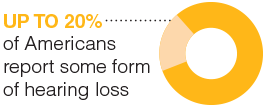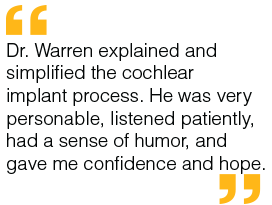In early spring of 2012, Jacob was taking care of some yard work when he suddenly noticed his right ear felt clogged. As a lifelong guitar player and music enthusiast, the sensation was annoying, but he did not think much of it at the time. For the following three weeks, he assumed he simply had a sinus issue and he tried to take care of it at home.
When the feeling did not subside, Jacob decided to seek treatment at The Oregon Clinic Ear, Nose & Throat – Plaza with Dr. Justin Rufener. When an initial strong dose of steroids from Dr. Rufener failed to relieve Jacob’s discomfort, Jacob underwent a series of tests and evaluations with audiologist Wayne Brown. It was then discovered that Jacob had completely lost the hearing in his right ear. The cause of Jacob’s hearing loss was ultimately determined to be idiopathic, which means unknown.

Solution One: Hearing Aid
Since the hearing that remained in Jacob’s left ear was unable to fully compensate for the sudden loss of hearing in his right ear, he would need to get a hearing aid in order to hear. For the next six months, he tried hard to utilize a hearing aid. However, he still found it was difficult to hear in many situations.
“My hearing loss affected everything about my social and work life,” Jacob said. “I could not hear other people when driving and I could not hear in social settings.”
Solution Two: Bone Anchored Implant
Jacob and Dr. Rufener next determined Jacob could benefit from a hearing device called a bone anchored implant (BAI).
“In Jacob’s case, the BAI was initially a good choice because he had lost all functional hearing in the right ear, but still had hearing in the left ear,” Dr. Rufener said. “This allowed us to implant the bone-anchored device next to his right ear and attach a vibratory processor which would use the sound conducting properties of the bone of his skull to route sound to his good ear.”
For the next two and a half years, the BAI drastically improved Jacob’s hearing, allowing him to function normally at work and at home. Then, during the winter of 2015, Jacob suffered a severe upper respiratory virus. The illness deteriorated the remaining hearing in his left ear, which meant that the BAI could no longer benefit Jacob.
The Ultimate Solution: Cochlear Implant
Upon Dr. Rufener’s recommendation, Jacob next met with Dr. Warren at The Oregon Clinic Westside Ear, Nose & Throat to explore possible next steps. After further testing with audiologist Lindsey Hill, AuD, the three of them determined that Jacob would be an excellent candidate for a cochlear implant.
“A cochlear implant is an implanted device that uses electricity to stimulate the hearing nerve,” Dr. Warren said. “There are two components to the implant: one that is internal and placed during surgery and one worn on the outside to power and stimulate the interior portion.”
A cochlear implant differs from a hearing aid, which merely amplifies sounds, in that it replaces improper or non-functioning components of the inner ear. Unlike hearing aids, cochlear implants are often covered by insurance plans, including Medicare.
“I was impressed with how Dr. Warren explained and simplified the cochlear implant process,” Jacob said. “He was very personable, listened patiently, had a sense of humor, and gave me confidence and hope. I decided I had way more to gain than lose.”

“There is a lot of commitment that is required with a cochlear implant, ” Dr. Hill said. “Above all is having patience while your brain adjusts to hearing in a brand new way.”
A common misconception is that cochlear implants are only for people who are completely deaf. According to Dr. Warren, this is not true—many people on the hearing spectrum can benefit from a cochlear implant. The only way to know for certain is to have a formal evaluation with an audiologist.
“The cochlear implant brought volume and clarity I had not had in many years,” Jacob said. “I left their office feeling like the world of hearing had been awakened.”
Over the next eight months, Dr. Hill worked with Jacob to adjust his implant settings. Jacob continued to experience changes and improvements in his ability to hear in most any situation, including his favorite hobby, music.
“The cochlear implant is not supposed to help music a great deal, but it has allowed me to continue to play, record, and appreciate all types of music,” Jacob said. “It is not perfect, but with time and experimentation, I can enjoy listening and playing.”